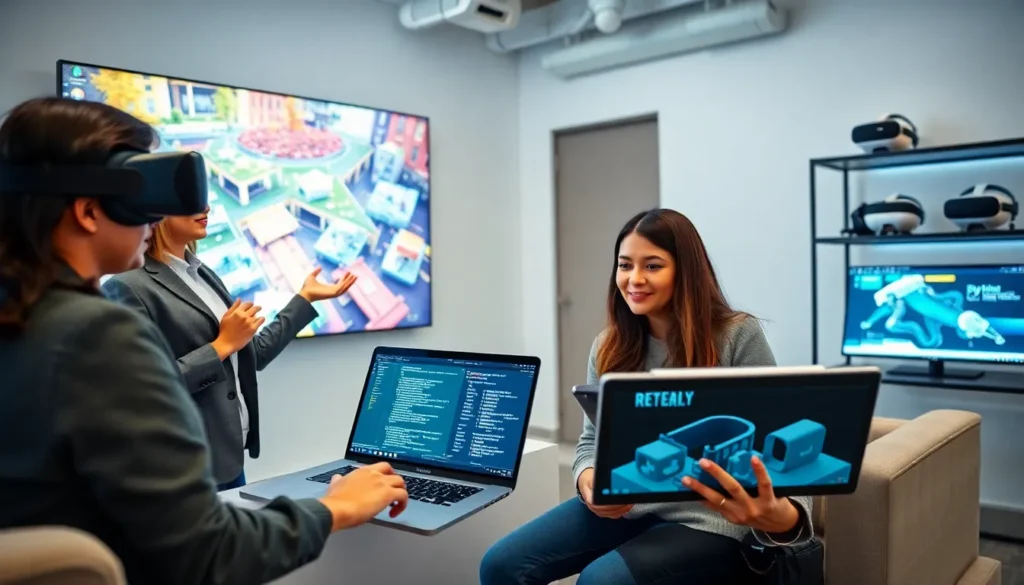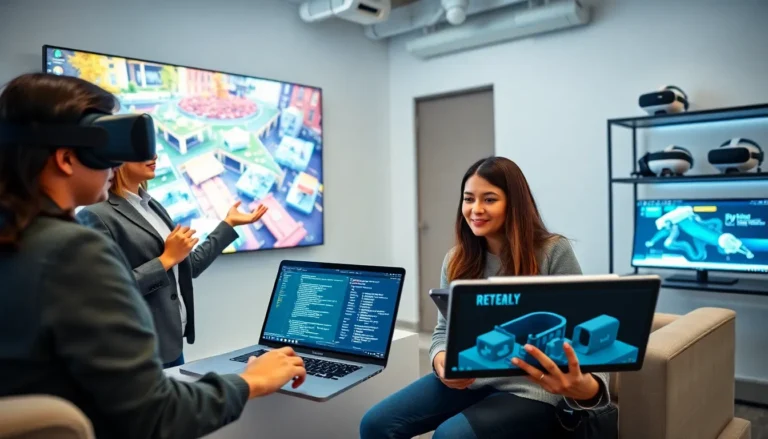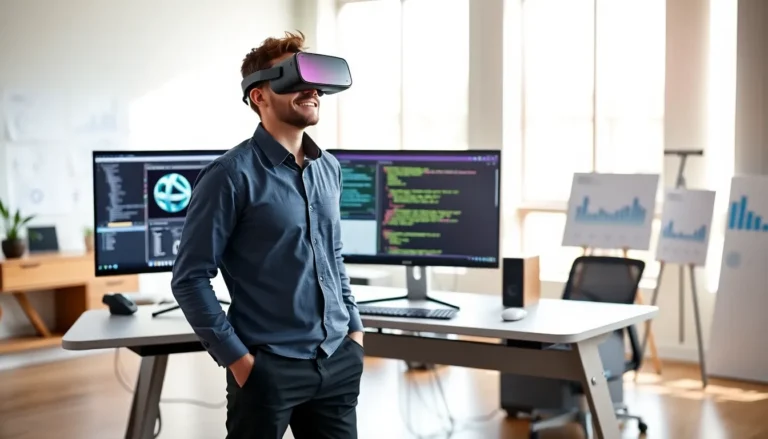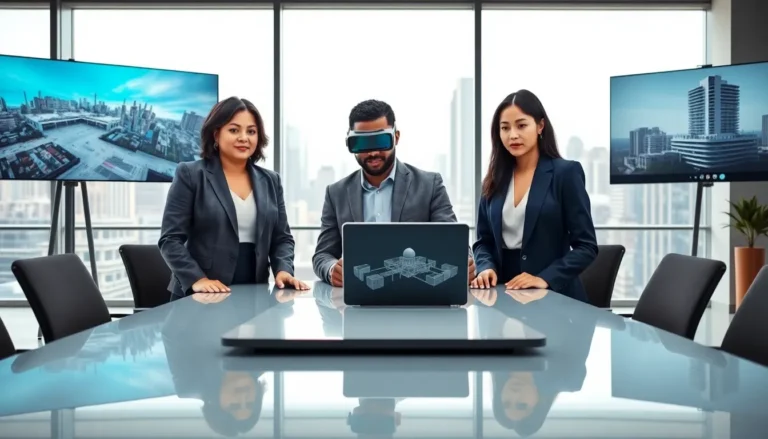Ever tried to walk in a digital world where gravity is just a suggestion? Welcome to the realm of virtual reality (VR), where developers are the architects of our wildest dreams, or more accurately, our wildest simulations. As technology races ahead, the demand for VR developers is skyrocketing, making it the hottest gig on the tech block. Don’t worry if you’re not familiar with all the jargon just yet: this article has got you covered. Think of VR developers as the magicians of the digital age, pulling entire experiences out of thin air and crafting breathtaking universes. Ready to immerse? Let’s explore this fascinating field.
Table of Contents
ToggleWhat Is Virtual Reality Development?
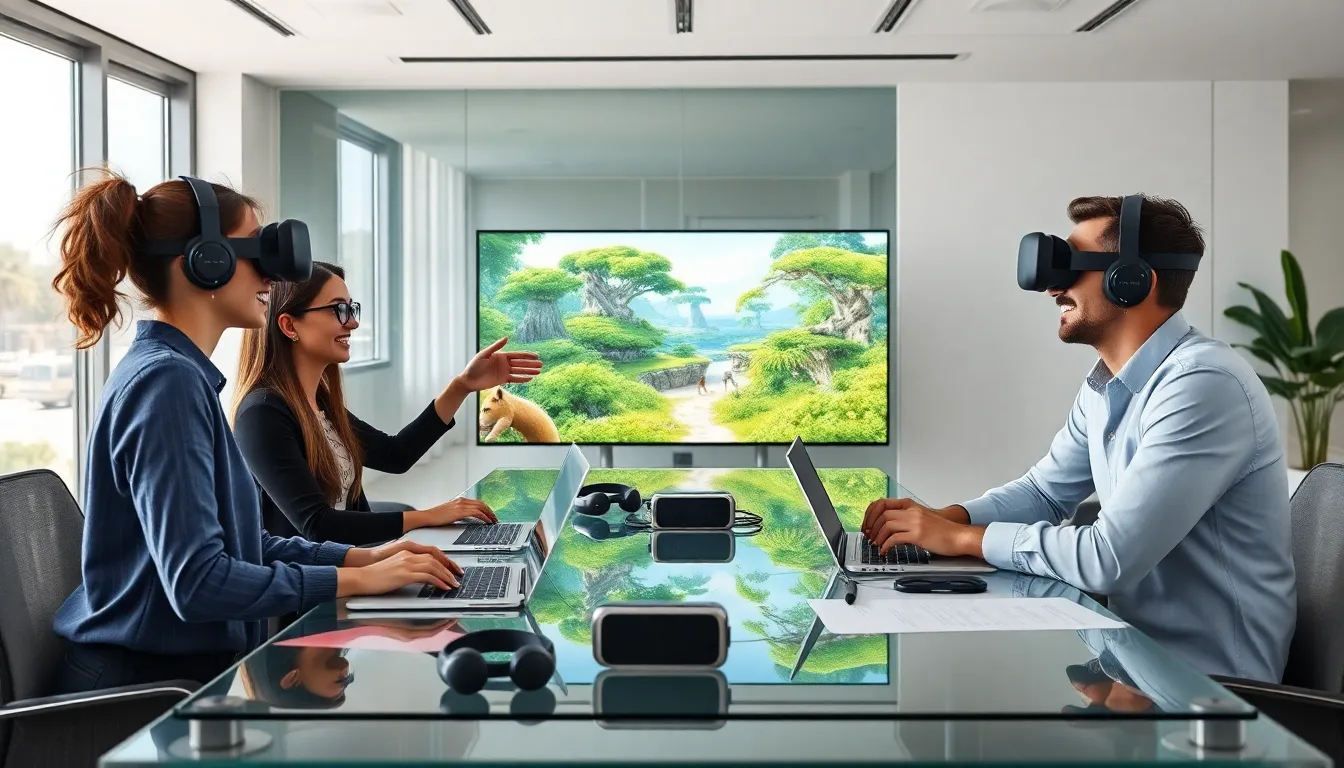
Virtual reality development involves creating immersive digital environments that simulate the physical world or create entirely new ones. Simply put, it’s about building experiences that can fool the senses into perceiving a virtual world as real. Developers use various tools and programming languages to achieve this, designing everything from games to training simulations. Imagine stepping into a lifelike jungle where you can hear the rustling leaves, this is the magic of VR development at work.
It starts with concepts and designs that are crafted using powerful software, often incorporating 3D modeling techniques. From there, developers program interactions and refine the user experience, ensuring that when users don their VR headsets, they’re greeted with smooth, engaging environments. It’s a blend of storytelling, technology, and artistic expression that eventually brings these virtual experiences to life.
Key Skills and Technologies Used by VR Developers
When it comes to virtual reality development, a specific skill set is essential. First and foremost, proficiency in programming languages like C# and C++ is crucial. These languages are often used within VR platforms to create interactive elements. Familiarity with game engines, particularly Unity and Unreal Engine, allows developers to build intricate, immersive environments effectively.
Another vital skill is 3D modeling and animation. Tools like Blender and Maya are commonly used for creating detailed graphics that enhance the immersion factor. But, strong problem-solving and critical thinking abilities are equally important: developers must navigate technical challenges that arise during the creation process.
Also, knowledge of hardware is key. VR developers need to understand various VR headsets and motion-tracking technologies to optimize the user experience. By mastering these skills and technologies, a VR developer can bring imagination to life and transport users into engaging, interactive worlds.
The Role of VR Developers in Different Industries
Virtual reality isn’t just for gaming: it’s penetrating various industries with transformative effects. In education, VR developers create immersive learning experiences that make complex subjects easier to grasp. For instance, students can explore the human body in 3D or visit historical landmarks without leaving their classrooms. This approach enhances engagement and understanding.
In healthcare, VR development is making waves through simulations that help train medical professionals. Surgeons can practice in a risk-free environment and refine their skills before entering the operating room. This technology fosters better training and eventually improves patient outcomes.
The real estate sector has also begun utilizing VR to showcase properties. Prospective buyers can take virtual tours from the comfort of their homes, exploring every nook and cranny of potential new digs. Similarly, the entertainment industry leverages VR for enhanced storytelling in movies and concerts, offering audiences experiences that were once merely aspirational. This versatility showcases how crucial VR developers are across multiple fields.
Challenges Faced by Virtual Reality Developers
Even though its allure, virtual reality development isn’t without its fair share of challenges. One significant hurdle is hardware limitations. Although VR technology has advanced, producing high-quality experiences requires robust systems. These limitations can impede extensive accessibility, particularly among consumers who may not have access to cutting-edge technology.
Another challenge is ensuring user comfort. Many users experience motion sickness or discomfort when engaging with VR for extended periods. Developers need to find a balance between realism and comfort, which often involves meticulous design choices.
Plus, the rapid pace of technological advancements can be overwhelming. As tools and platforms evolve, developers face the constant pressure to keep their skills updated or risk falling behind. These challenges require not only technical expertise but also adaptability and resilience.
Future Trends in Virtual Reality Development
Looking ahead, the future of virtual reality development appears bright, with several trends emerging on the horizon. One of the most promising developments is the integration of artificial intelligence (AI) into VR experiences. AI can personalize user encounters, creating adaptive environments that respond to individual behavior and preferences.
Besides, as 5G technology rolls out globally, the potential for mobile VR experiences expands dramatically. This new connectivity promises more seamless, high-quality virtual experiences that can be enjoyed anywhere, using smartphones or standalone devices.
Also, the collaboration between industries, such as health, education, and entertainment, will enhance VR’s applicability and utility. Developers will increasingly find themselves working across sectors, further enriching the VR landscape. These trends indicate that the future will see even more innovative applications for VR, making it an exciting time to be involved in this industry.
How to Become a Virtual Reality Developer
For those interested in entering the field of virtual reality development, a structured approach can streamline the journey. Start by acquiring a strong foundation in programming languages essential for VR, such as C# and C++. Online courses and tutorials can provide valuable resources to build these skills.
Next, immerse yourself in VR technologies by enrolling in relevant courses or attending workshops. Understanding VR tools like Unity and Unreal Engine will set you apart in the job market. Also, honing your 3D modeling and animation skills using software like Blender can significantly enhance your portfolio.
Participating in projects, whether personal, freelance, or internships, will provide practical experience and showcase your abilities to potential employers. Building a solid portfolio demonstrating your skills and projects will be key when vying for jobs. Finally, connecting with industry professionals through networking platforms and conferences can open doors and provide invaluable insights into the ever-evolving field of VR.

